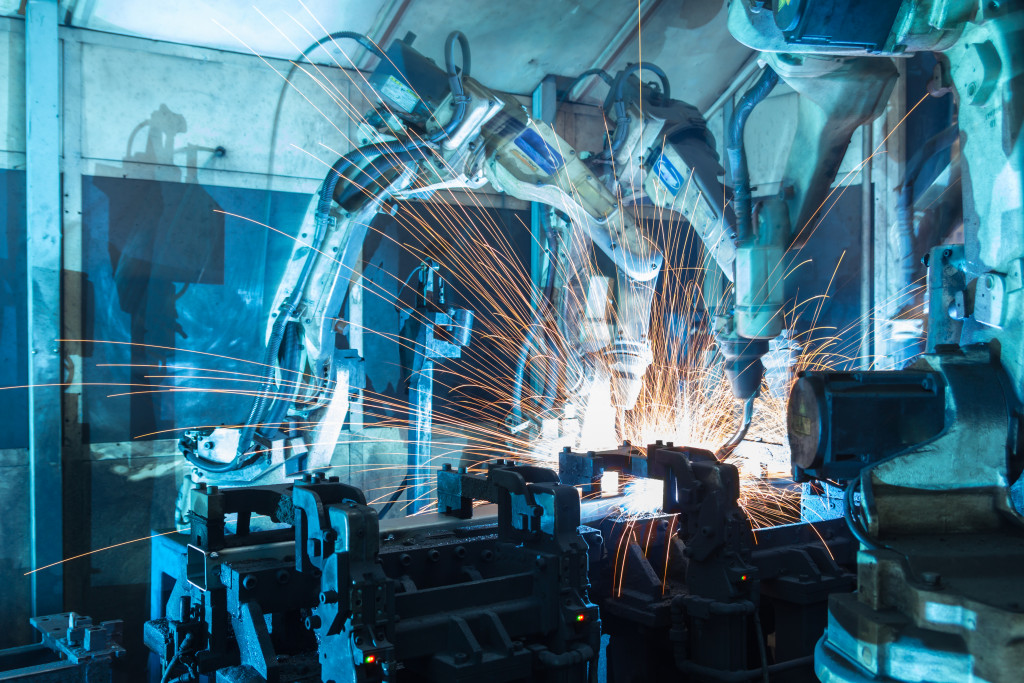- Laser displacement sensors are precision instruments that provide accurate measurements of motion and distances within a production line.
- Robotic automation technology is an essential part of the modern manufacturing industry due to its ability to complete tasks repetitively.
- Automated quality control technologies check for size accuracy, color variances, and other issues early on in the assembly line.
- Computer numerical control (CNC) machinery guarantees precision and uniformity in replicating parts, and its use eliminates human error.
Accuracy is essential for the success of any production line. Production lines can achieve maximum efficiency and reduce costly errors with the right equipment and processes. By utilizing these advanced tools, companies can be sure their products meet quality standards and customer expectations without sacrificing speed or safety on the job site.
Laser Displacement Sensor
A laser displacement sensor is a precision instrument that accurately measures motion and distances within a production line. By providing superior accuracy compared to traditional displacement measuring methods, these sensors are essential for achieving the highest levels of quality in manufacturing operations.
For example, laser displacement sensors can measure the gap sizes between two parts being assembled and determine the size of components before installation onto a production item. The versatile range of capabilities makes them ideal for assembly process monitoring, dimensional control, and incoming material inspection.
These devices can be used with single-point measurements or scanning over an entire surface, depending on the application requirement. Furthermore, laser displacement sensors have good repeatability capabilities and high operating speeds, so they can be deployed to multiple locations on the production line to maximize throughput and ensure quality throughout the process.
Automation Technologies
Here are some automation technologies that can ensure accuracy in production lines:
Robotic Automation Technology

Robotic automation technology is essential to the 21st-century manufacturing industry, allowing production lines to run more efficiently and effectively. This technology makes use of various kinds of robots to perform processes such as assembly, welding, painting, and packaging that once could only be done by humans.
Many employers are looking for robotic automation technology to increase productivity and accuracy, thanks to its automated process control features. It also eliminates manual labor tasks that can be dangerous for human workers in specific applications.
Automated Quality Control

Automated Quality Control (AQC) is a vital part of any modern production line process that ensures accuracy and precision. AQC forms an invaluable step in the production process, objectively testing for quality at each stage or for the product as a whole. This is often done through automated systems.
An example is a technology that checks for size accuracy and color variances in materials on a production conveyor belt to detect errors early on in the assembly line. AQC helps identify problems and malfunctions quickly so they may be corrected with minimal cost and disruption to production. This way, it undoubtedly pays off in the long run by keeping overall costs down, increasing product quality assurance, and ultimately reducing waste.
Computer Numerical Control (CNC) Machinery
Computer Numerical Control (CNC) machinery is a type of equipment used to automate the production line regardless of the size or complexity of the task. On an industrial scale, CNC technology guarantees that all parts are precisely replicated in uniformity and accuracy. This incorporates programming that offers flexibility in designing components and controlling aspects, such as speed and depth of cut – crucial for numerous manufacturing operations.
Furthermore, using CNC-controlled machines for manufacturing tremendously reduces human error, which yields higher productivity rates at a lower cost. It has become an instrumental part of many industries, making it one of the essential pieces in any production line.
Statistical Process Controls (SPCs)
Statistical Process Controls (SPCs) are essential equipment in production lines, as they ensure accuracy and quality assurance through systematic control. They use statistical models to record and analyze data about a process, which helps detect aberrations and issues that could negatively affect the process.
SPCs utilizes unique algorithms to establish when a measuring device accurately measures end products and can shut down processes automatically using sensors when targets aren’t being met. The use of SPCs further arms production line supervisors with the ability to perform real-time feedback that can be instrumental to their success – thanks to the ability to set machine parameters quickly, staff can make rapid adjustments based on measurements taken by the SPCs for immediate impact. Their essential nature makes them vital to any well-managed production line.
Programmable Logic Controllers (PLCs)
Programmable Logic Controllers (PLCs) are essential equipment used in production lines to guarantee accuracy and efficiency. They are programmed computers explicitly designed for industrial environment automation, with durability, robustness, and reliability often built into their design.
Controllers can efficiently regulate and coordinate multiple functions or processes within a manufacturing setting by utilizing PLCs as part of a system. They operate on computer programs that enable them to adapt their operations according to real-time conditions encountered or changes needed over time.
For example, sensors can detect malfunctions in the production chain and the program will recognize the fault and immediately adjust it so that the line keeps running smoothly. This makes PLCs an invaluable tool in many industries, such as pharmaceutical companies, especially those requiring consistent high-accuracy manufacturing levels.
These are some of the automation technologies that can be implemented to ensure accuracy in production lines. Utilizing these tools allows companies to reduce errors, improve quality assurance, and increase productivity at a lower cost.



